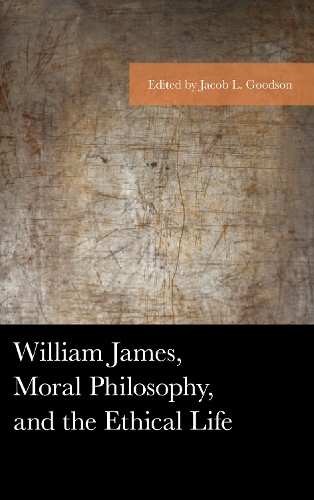
William James, Moral Philosophy, and the Ethical Life
(Paperback)
Available Formats
Publishing Details
William James, Moral Philosophy, and the Ethical Life
By (Author) Jacob L. Goodson
Contributions by Guy Axtell
Contributions by Gregory Eiselein
Contributions by Jacob L. Goodson
Contributions by Amy Kittelstrom
Contributions by D. Micah Hester
Contributions by Joseph D. John
Contributions by Roger Ward
Contributions by John R. Shook
Contributions by Neal A. Tognazzini
Bloomsbury Publishing PLC
Lexington Books
29th October 2019
United States
Classifications
Professional and Scholarly
Non Fiction
History of the Americas
Psychology
170
Physical Properties
Paperback
430
Width 152mm, Height 224mm, Spine 31mm
644g
Description
Virtue theory, natural law, deontology, utilitarianism, existentialism: these are the basic moral theories taught in Ethics, History of Philosophy, and Introduction to Philosophy courses throughout the United States. When the American philosopher William James (1842 1910) find his way into these conversations, there is uncertainty about where his thinking fits. While utilitarianism has become the default position for teaching Jamess pragmatism and radical empiricism, this default position fails to address and explain Jamess multiple criticisms of John Stuart Mills formulaic approach to questions concerning the moral life. Through close readings of Jamess writings, the chapters in William James, Moral Philosophy, and the Ethical Life catalogue the ways in which James wants to avoid the following: (a) the hierarchies of Christian natural law theory, (b) the moral calculus of Mills utilitarianism, (c) the absolutism and principle-ism of Immanuel Kants deontology, and (d) the staticity of the virtues found in Aristotles moral theory. Elaborating upon and clarifying Jamess differences from these dominant moral theories is a crucial feature of this collection. This collection, is not, however, intended to be wholly negative that is, only describing to readers what Jamess moral theory is not. It seeks to articulate the positive features of Jamess ethics and moral reasoning: what does it mean to an ethical life, and how should we theorize about morality
Reviews
William James (18421910) is best known for his groundbreaking work in the study of consciousness, psychology of emotions, and philosophy of religion and for the development of the philosophy of pragmatism. His moral philosophy and beliefs about the ethical life have received far less attention and are more difficult to categorize. Was James a Stoic a utilitarian a deontologist an existentialist a virtue ethicist Distinguishing between early James and late James, this collection provides an illuminating and welcome map of where things stand in Jamess moral and ethical thought as they relate to the history of moral and ethical philosophy. Goodson (Southwestern College) organizes the essays in roughly chronological order according to James's writings. This allows readers to see the evolution and development of Jamess ideas in moral and ethical philosophy over the course of his life. This volume is required reading for anyone interested in exploring the distinctive contributions James made to moral and ethical thought. Summing Up: Recommended. Lower-division undergraduates through faculty; general readers. * CHOICE *
Author Bio
Jacob L. Goodson is assistant professor of philosophy at Southwestern College.
